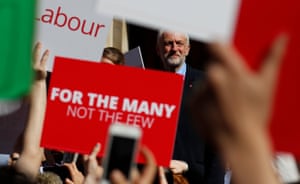{UAH} Corbyn’s fightback and May’s stumbles prove election campaigns still matter
Jeremy Corbyn has already smashed several core tenets of conventional Westminster wisdom – starting with the previously firm belief that a backbench member of his wing of Labour could never become party leader. Now he is testing yet another: the established view that campaigns don't matter.
Received opinion among political cognoscenti has long been that the three or four weeks of official electioneering rarely make much difference. There can be gaffes and shock polls and big rallies, but in the end the voters tend to do what they had planned to do in the first place. Comparison of pre-campaign polling with the final outcome has, in the past, broadly suggested that everyone could have saved themselves a lot of time and energy: if we'd voted on the day the election was called, we'd have arrived at the same result.
Not this time, it seems. You don't even have to believe YouGov's seat projection, published in today's Times, which shows Labour gaining seats and the Tories losing their overall Commons majority, to see that the polling average shows a marked tightening between the two main parties since Theresa May fired the starting gun on this snap election. What had been a mighty lead for the Conservatives has shrunk over the course of these few short weeks of campaigning.
If that picture is right – and, given pollsters' recent track record and the wide variation among them, some scepticism is surely in order – then the reasons might not be all that complicated. In two of the areas that matter most in determining voters' choices – a party's leader and its policies – Labour have done well and the Tories have done badly.
On leadership, Corbyn could not have started from a weaker base: his approval ratings were low verging on subterranean. But he has had a good campaign, vindicating those who said that once he had the benefit of equal time on the broadcast media, voters might come to see him in a new light.
On Monday's not-quite TV debate, he came off, mostly, as affable and fluent. Whether on the Jeremy Vine Show on Radio 2, or talking about his allotment on The One Show, he has seemed like a man comfortable in his own skin – a quality that seemed to elude Ed Miliband, for one.
True, he stumbled badly in his Woman's Hour interview with Emma Barnett yesterday, but he deserves credit both for admitting as much later in the day and for scolding the most feverish of his supporters, who had subjected the broadcaster to a deluge of sexist and anti-Jewish abuse.
For Theresa May, it could not have been more different. She is an awkward public performer, hesitant and apparently nervous. She seems to weigh and calibrate her answers to even the most innocuous personal questions. It's avowedly not her fault, but her facial expression often defaults to an unfortunate grimace.
More substantially, this campaign has seen her trash her brand as a strong leader. Instead of seeming decisive, her series of now notorious U-turns – including the calling of an early election that she insisted would never happen – has suggested that she can be weak, liable to buckle under pressure. There is no clearer example than her plan for social care, an unprecedented instance of a manifesto proposal dropped before polling day.
Which brings us to policy. The only Conservative plan to cut through and into the public consciousness was one that terrified a group that represents the Tory bedrock: the elderly. The "dementia tax" was a toxic proposal; dropping it was a humiliation; the failure to admit it had been dropped made May a laughing stock. (Witness the derision poured on May from the studio audience several times during the Channel 4/Sky News show.)
Labour, by contrast, produced a manifesto full of proposals that people like, from free tuition fees to renationalising the railways. We will not know until 8 June whether voters will find all those costly delights too good to be true – whether they deem Labour credible – but there can be no denying that Labour's manifesto has helped the party's chances, while the Tories' hurt theirs.
None of this may be enough to upend every prediction and carry Jeremy Corbyn to Downing Street. But if May is returned with a Commons presence far below the expectations of even a month ago, it will suggest that one more bit of conventional wisdom needs to be retired along with all the rest. It will prove that campaigns matter.
Disclaimer:Everyone posting to this Forum bears the sole responsibility for any legal consequences of his or her postings, and hence statements and facts must be presented responsibly. Your continued membership signifies that you agree to this disclaimer and pledge to abide by our Rules and Guidelines.To unsubscribe from this group, send email to: ugandans-at-heart+unsubscribe@googlegroups.com






0 comments:
Post a Comment